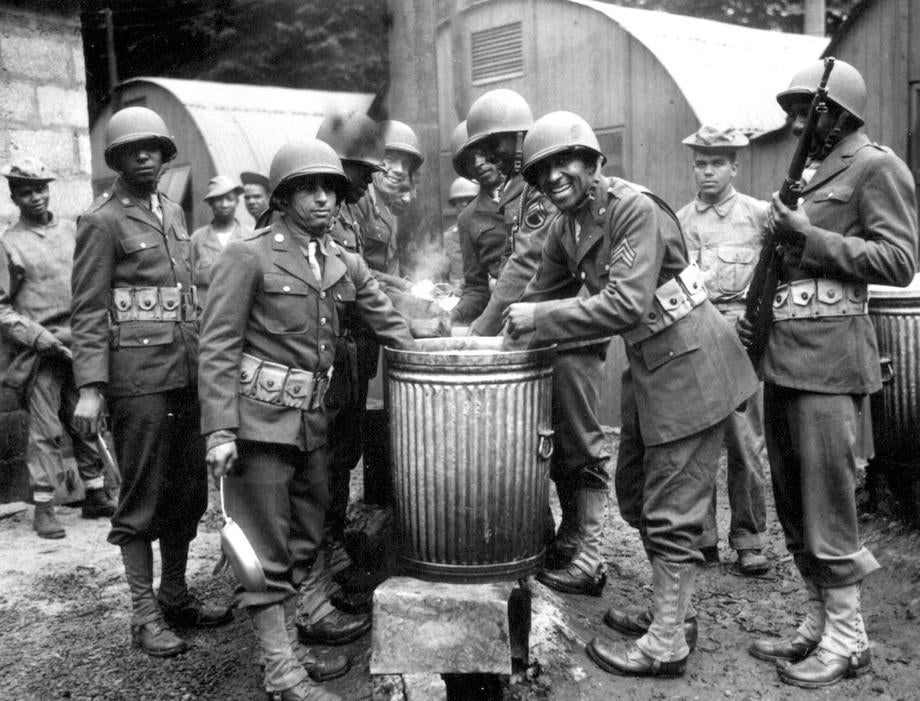The Vault is Slate’s history blog. Like us on Facebook, follow us on Twitter @slatevault, and find us on Tumblr. Find out more about what this space is all about here.
Starting as early as 1941, correspondents began reporting and discussing military slang in the pages of American Speech, the journal of the American Dialect Society. Here’s a list of some of the soldiers’ language that they saw emerging during and immediately after the war.
In October 1941, the journal republished part of a “Glossary of Army Slang” that had been distributed by the Public Relations Division of the US Army. The list, printed before the war, provided a basis for the subsequent authors to work upon, as they revised and updated terms. Many of the authors who contributed to American Speech during this period mentioned their own military service, during which they took notes on the words that they heard. Others interviewed students returning to college campuses after stints in the military.
Although some of this argot relates to combat, much of the military slang comes from the everyday lives of people working together in close quarters and in isolation. Thus, the large number of slang terms related to complaining (or “grousing”), incompetence, the structures of military authority, and bad military food.
The slang that appeared in official compilations and in the pages of American Speech was often sanitized for public consumption. Robert Shafer, in reporting Air Force slang to American Speech’s “Dialect” column, noted: “This Army stew is sometimes too hot to serve to civilians. The ingredients of the present dish have been selected with a view to the sedentary reader whose digestion is not so strong.”
Above all, the soldier-linguists who wrote in to American Speech were fascinated by the evolution of language they saw occurring in the military, as people from across the country came together in unfamiliar circumstances. As one such correspondent, Henry Alexander, wrote, “Language is able to adapt itself, almost like an organism, to new needs in a rapid and efficient manner.”
Some WWII-era American Military Slang:
Army strawberries: Prunes. (“Glossary of Army Slang,” US Army PR, 1941.)
Ash can: Depth charge. (Henry Alexander, “Words and the War,” 1944.)
Beat your gums: To talk a lot about a topic. (A.R. Dunlap, “GI Lingo,” 1945.)
Bedpan commando: Medical corpsman. (Dunlap)
Behavior report: Letter to a girl. (Glossary)
Big wheel: “Anyone with a little authority.” (Robert Shafer, “Air Force Slang,” 1945.)
“Blow it out your barracks bag”: “Shut up! Go to hell!” (Dunlap)
Bog-pocket: Tightwad. (Glossary)
Boudoir commando: Home-front hero. (Dunlap)
Browned off: Annoyed or fed up. (Also: Brassed off.) (Alexander)
BTO: “’Big time operator’—someone who thinks he is important.” (Shafer)
Bubble dancing: Dishwashing. (Glossary)
Cab happy: “’Nuts’ about driving.” (Dunlap)
Carrier pigeon: Serviceman acting as officer’s messenger. (Glossary)
Cornplaster commando: Infantryman. (Dunlap)
Devil’s piano: Machine gun. (Glossary)
Dit happy: “’Batty’ because of copying too much radio code.” (Dunlap)
Dodo: “A[n Air Force] cadet before he starts flying.” (Shafer)
Gremlins: “Mythical creatures who are supposed to cause trouble such as engine failure in aeroplanes, a curious piece of whimsy-whamsy in an activity so severely practical as flying. Now the gremlin seems to be extending its sphere of operations, so that the term can be applied to almost anything that inexplicably goes wrong in human affairs.” (Alexander)
Gubbins: “Used to describe almost any part of the equipment of a plane, with about the same meaning as gadget.” (Alexander)
Egg in your beer: “Too much of a good thing.” (Glossary)
Eggs: Bombs. (Dunlap, Alexander)
Fish: Torpedos. (Alexander)
Flak: Abbreviated form of German word Fliegerabwehrkanone, or “pilot warding-off cannon” (anti-aircraft fire). (Alexander)
French leave: AWOL. (Glossary)
Fruit salad: “A number of campaign ribbons worn on the chest.” (Shafer)
JANFU: “Joint Army-Navy foul-up.” (Dunlap)
Juice jerker: Electrician. (Glossary)
Kite: Airplane. (Also, cab.) (Alexander)
Landing gear: Legs. (Glossary)
Mae West: An inflatable rubber life-belt that added buoyancy to the wearer’s chest. “I need not enter into the anatomical details which throw light on this term,” Alexander wrote delicately.
Mae West herself sent a letter to the RAF, Alexander added, in which she showed “delight in becoming an integral part of the English language”: “I’ve been in Who’s Who and I know what’s what, but it’ll be the first time I ever made the Dictionary.”
Mae West, meaning 2: A tank with two protuberant turrets. (Alexander)
Maggie’s drawers: “Red flag used on rifle range to indicate a miss.” (Glossary)
Mickey Mouse movies: Instructional films in personal hygiene. (Dunlap)
Mitt flopper: A soldier who does favors for his superiors, or salutes unnecessarily; a ‘yes man.’” (Glossary)
Ninety-day wonder: “An officer who holds a commission by virtue of having attended a three-months course direct from civilian life” (Dunlap)
Penguin: Air Force servicemember who doesn’t fly. (Alexander)
Prang (verb): To smash or bomb a target. (Alexander)
Prune: An “inefficient airman.” (Alexander)
“Roll up your flaps”: “Stop talking.” (Glossary)
“See the chaplain”: ”Stop grousing.” (Glossary)
Shit for the birds: “Nonsense, drivel, irrelevant matter. (A variant: ‘That’s for the birds.’ It’s meaningless.)” (Dunlap)
Skin: “A reprimand, oral or written, for a flagrant violation of Army rules. Presumably from ‘skin ‘im alive.’” (Shafer)
Snap your cap: “Become excited, flustered.” (Dunlap)
Sugar report: Letter from a sweetheart. (Glossary)
Taxi up: Come here. (Glossary)
Tiger meat: Beef. (Glossary)
T.S.: “Tough situation! Tough shit!” (Dunlap)
T.S. Slip: “When a soldier’s complaints become unbearable, his listeners frequently tell him to fill out a ‘T.S. Slip’ and send it to the chaplain.” (Dunlap)
Zombie: “Soldier who falls in next to lowest category in Army classification tests; see goon.” (Glossary)

National Archives.